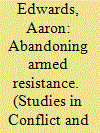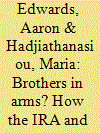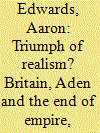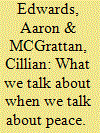|
|
|
Sort Order |
|
|
|
Items / Page
|
|
|
|
|
|
|
| Srl | Item |
| 1 |
ID:
087392


|
|
|
|
|
| Publication |
2009.
|
| Summary/Abstract |
This article explores the Ulster Volunteer Force's (UVF) decision in May 2007 to abandon its campaign of "armed resistance" and pursue "a non-military, civilianized, role" in Northern Ireland. It does so by analyzing the UVF's actions in light of the academic literature on strategic terrorism. The central argument advanced in the article is that the UVF's decision to put its weapons "beyond reach" and re-structure its organization along civilian lines is (a) internally consistent with its stated policy of countering "violent nationalism," (b) symptomatic of the transformation in the sociopolitical context since the 1994 paramilitary cease-fires, and (c) the logical outworking of the group's lack of popular legitimacy among its core Protestant working-class support-base. The article concludes with an assessment of the risks and possible dividends that the end of UVF terrorism holds for the Northern Ireland peace process.
|
|
|
|
|
|
|
|
|
|
|
|
|
|
|
|
| 2 |
ID:
181041


|
|
|
|
|
| Summary/Abstract |
Throughout the 1950s Britain faced unprecedented challenges to its imperial rule. Civil disobedience, insurgency and terrorism gripped its colonies as the flames of nationalism and anti-colonialism burned brightly across the world. In two of Britain’s most important Cold War strategic outposts, Northern Ireland and Cyprus, insurgents belonging to the IRA and EOKA launched armed campaigns to undermine British rule. This article examines the insurgencies on both islands in the period 1955–59, comparing the respective approaches taken by the IRA and EOKA to guerrilla warfare. Drawing on original English and Greek language sources, as well as other empirical evidence, the article argues that the IRA and EOKA interpreted their struggles in complementary ways as part of a broader national liberation struggle, which, above all, suggests a shared understanding of British imperialism. Admittedly, beyond a mutually perceived ‘brotherly bond’, IRA leaders did not apply specific military lessons they had learned from members of EOKA while in English prisons in the 1950s until the much later Northern Ireland ‘Troubles’. Nevertheless, we argue that it is important to look at the genealogy of ideas for it reveals broader patterns regarding the organisational learning of militant groups engaged in campaigns against a common enemy.
|
|
|
|
|
|
|
|
|
|
|
|
|
|
|
|
| 3 |
ID:
181038


|
|
|
|
|
| Summary/Abstract |
Ireland’s ‘decade of centenaries’ means different things to different people.1 On the one hand, for Irish nationalists in Northern Ireland and the Republic,2 the term refers to the period bookended by the second reading of the Home Rule Bill in May 1912, which promised a degree of self-government for the island, and the ending of the Irish Civil War in May 1923. On the other hand, for Ulster unionists,3 the September 1911 march against Home Rule represented a mobilization of some 70,000 people that inspired the following year’s ‘Ulster Day’ where over 500,000 men and women signed the Ulster Covenant pledging resistance to Home Rule.
|
|
|
|
|
|
|
|
|
|
|
|
|
|
|
|
| 4 |
ID:
096700


|
|
|
|
|
| Publication |
2010.
|
| Summary/Abstract |
This article examines the British Army's deployment in support of the civil power in Northern Ireland. It argues that the core guiding principles of the British approach to counterinsurgency (COIN) - employing the minimum use of force, firm and timely action, and unity of control in civil-military relations - were misapplied by the Army in its haste to combat Irish Republican Army (IRA) terrorism between 1971 and 1976. Moreover, it suggests that the Army's COIN strategy was unsuccessful in the 1970s because commanders adhered too closely to the customs, doctrine, and drill applied under very different circumstances in Aden between 1963 and 1967, generally regarded as a failure in Britain's post-war internal security operations. The article concludes with a discussion of the British government's decision to scale back the Army's role in favour of giving the Royal Ulster Constabulary primacy in counter-terrorist operations, a decision which led ultimately to success in combating IRA violence.
|
|
|
|
|
|
|
|
|
|
|
|
|
|
|
|
| 5 |
ID:
105989


|
|
|
|
|
| Publication |
2011.
|
| Summary/Abstract |
It has been argued that a key factor in explaining the relative success of the Northern Ireland peace process is the role played by Non-Governmental Organisations (NGOs) and Community-Based Organisations (CBOs) in fostering dialogue and promoting shared space for cooperation across the communal divide. This article critically interrogates the normative import of that narrative, which implies that NGOs and CBOs occupy a higher moral ground than state-sponsored agencies. In large part this is attributed to both their indigenous character and their close proximity to terrorist violence. Indeed, several of these NGOs and CBOs are staffed by individuals who were convicted and imprisoned for terrorist-related offences. This article is less concerned with the actions of these non-state actors than with the political and moral foundations of the "peace consultancy industry," which has grown up around the design, implementation, and ongoing evaluation of these projects. We argue that by importing tautological-and sometimes cynical-understandings of the term "peace," these consultants risk complicity in reproducing the terroristic narratives that inspired and perpetuated the conflict in the first instance.
|
|
|
|
|
|
|
|
|
|
|
|
|
|
|
|
| 6 |
ID:
151837


|
|
|
|
|
| Summary/Abstract |
The Labour Government's decision to withdraw from Britain's overseas bases east of Suez in the 1960s had profound repercussions for British grand strategy. One of the last colonies to be evacuated was the port town of Aden, located on the south-western tip of the Arabian Peninsula. First seized by the East India Company on behalf of the British Empire in 1839, it became a Crown Colony almost a century later in 1937. By 1963, the British government had presided over Aden's entry into the fledgling Federation of South Arabia, a transitional body that was envisaged as a vehicle for independence. Drawing on the Labour's Party's archives, amongst a range of other sources, this article examines the shift in policy within the Labour government on the issue of Aden. It makes the case that, in contrast to the Conservative government's wholehearted support for Britain's tribal allies in South Arabia, Labour hedged its bets by balancing its policy off between the tribal rulers and the new radical nationalist opposition. By refusing to back the fledgling Federation government, Labour, instead, adopted a non-committal stance that would lead to greater strategic inertia in its policy towards the Middle East during the Cold War.
|
|
|
|
|
|
|
|
|
|
|
|
|
|
|
|
| 7 |
ID:
121897


|
|
|
|
|
| Publication |
2013.
|
| Summary/Abstract |
Kieran McEvoy and Peter Shirlow's response to our article is emblematic of the very tendencies towards the creation of problematic conceptualisations of peace that we had set out to critique. 1 Our article sought to problematise the over-confidence of claims that everything was "settled" and that we must thank terrorists and ex-terrorists for their magnanimous gift of having led us out of the very situation they led us into in the first place, as if peace was a privilege and not a right. We characterised the tendency to overinflate the role of paramilitaries in fostering peace as equivalent to the promotion of what we termed "terroristic narratives"-namely, stories that elided notions of "peace" with terrorists' own self-justifications. We suggested that the political effect of this was to defer recognition of the nationalising impulse behind terrorist campaigns in Northern Ireland-an impulse that remains in the post-hoc appraisals by terrorists of their actions. We suggested that the failure to tackle this could be deleterious for the stated objectives of both the British and Irish governments to cultivate a shared society in Northern Ireland.
|
|
|
|
|
|
|
|
|
|
|
|
|
|
|
|
| 8 |
ID:
106591


|
|
|
|
|
| Publication |
2011.
|
| Summary/Abstract |
The use of terrorism as a strategy for obtaining political goals by non-state actors persists in the international system, despite attempts by states to counter the phenomenon. This article explores the resurgent threat posed to British security by dissident Irish republicans in order to illustrate the limited utility of terrorism as a strategy in the current sociopolitical context. Therefore, it has three objectives: First, it explains how strategic theory can aid in constructing a conceptual framework for explaining the persistence of terrorism, in general, and dissident republican violence, in particular. Second, it examines the dissident threat in light of the general failure of "armed struggle" to achieve republican goals in Irish politics. It is argued here that dissident republicans have confused "means" with "ends" and that this, ultimately, demonstrates the futility of their violence. Finally, the article suggests ways of tackling the dissident republican variant of terrorism.
|
|
|
|
|
|
|
|
|
|
|
|
|
|
|
|
|
|
|
|
|